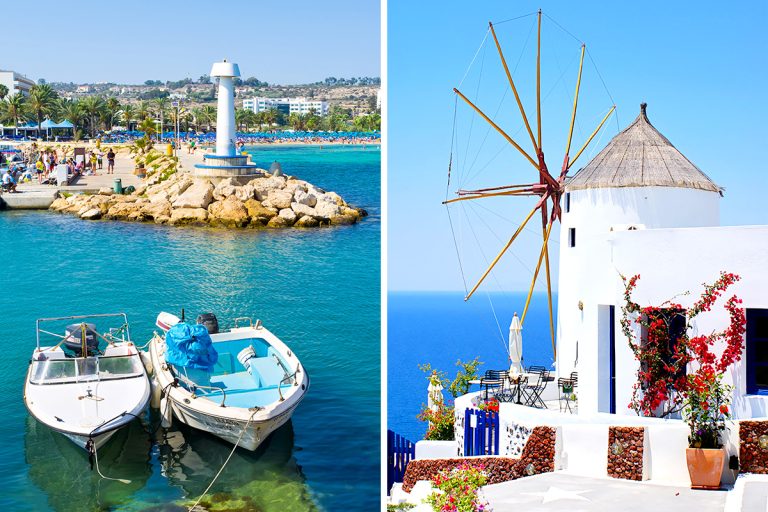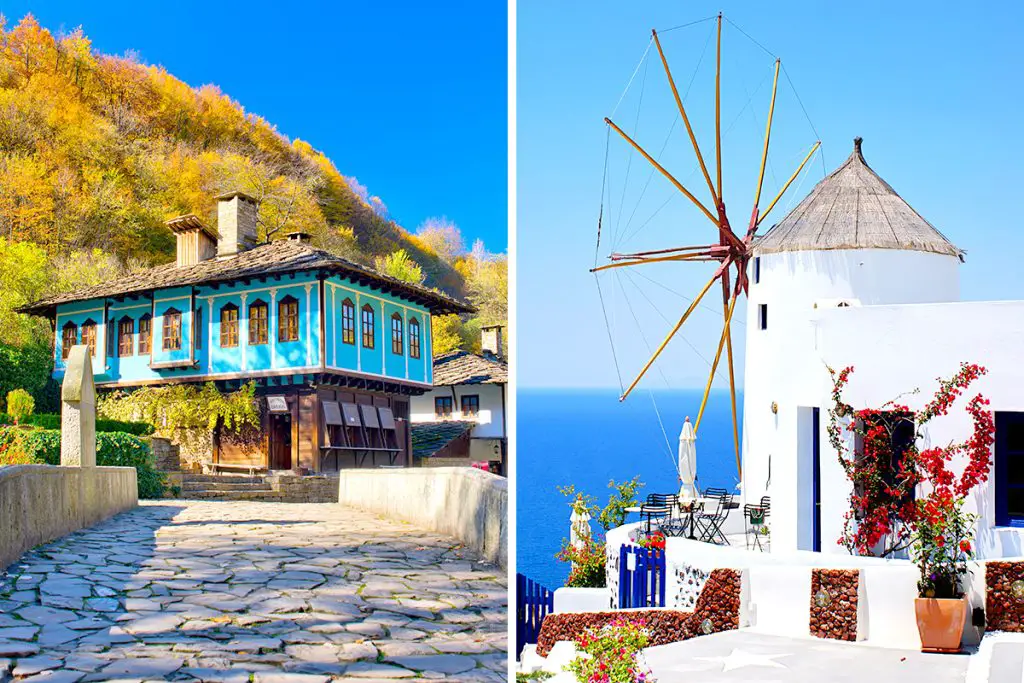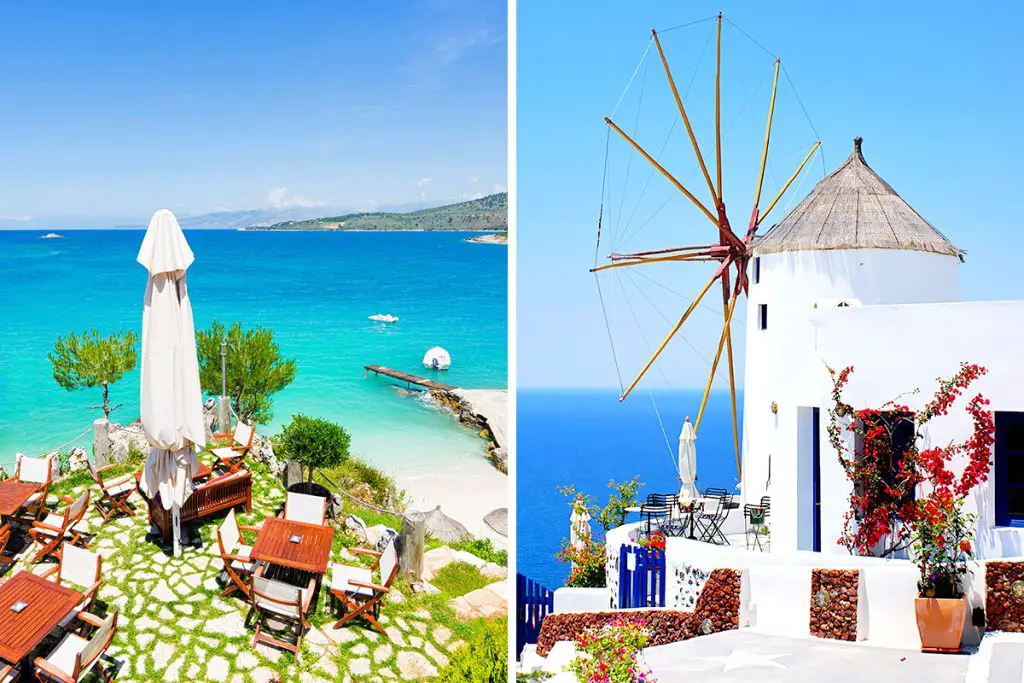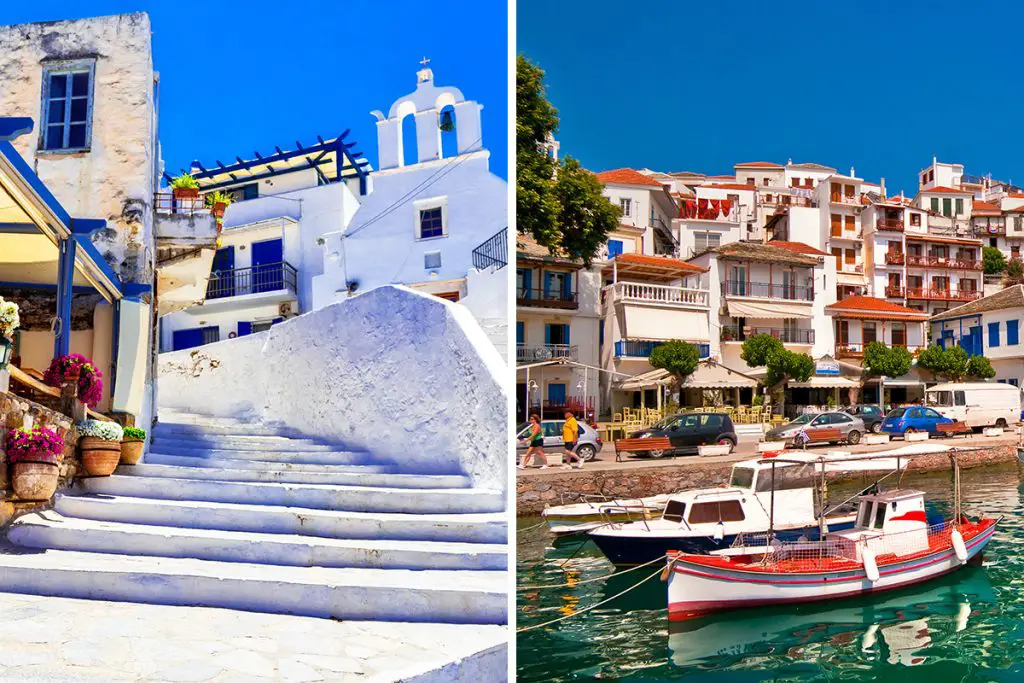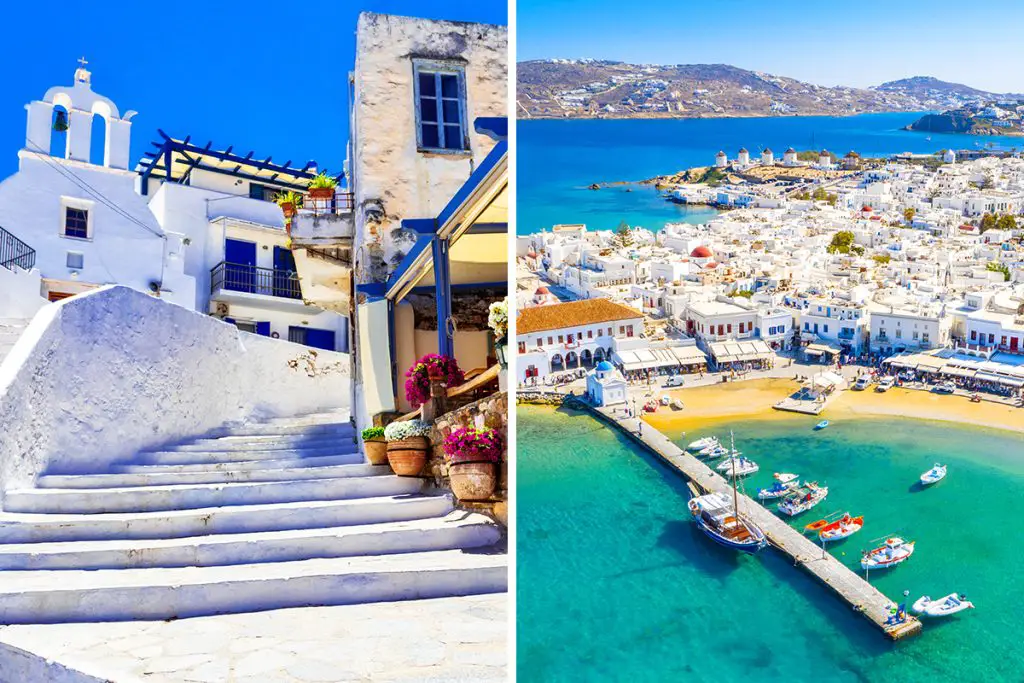Don’t fret! This piece is here to help you find clarity. By diving into the history and culture of both Cyprus and Greece, you’ll be armed with the insights needed to make your choice. So, are you ready to embark on this fascinating journey? Stick around, there’s a lot to explore!
History & Culture
Stepping into the past of Cyprus, it’s like flipping through the pages of a well-loved history book. This island nation in the Eastern Mediterranean has seen the rise and fall of many civilizations. Ancient Greeks, Romans, Byzantines, and Ottomans have all left their mark here, leading to a unique cultural tapestry that’s both enchanting and intriguing.
On the other hand, Greece is a veritable treasure trove of ancient history. As the cradle of Western civilization, it’s here that democracy was born, philosophy was nurtured, and epic tales of gods and heroes were spun. Walking through Greece, you’re essentially treading the same ground where Aristotle, Socrates, and Plato once stood.
While Cyprus is heavily influenced by its Greek and Turkish roots, it still retains a distinct cultural identity. The island’s history has shaped its traditions, customs, and way of life, creating a unique blend that’s unmistakably Cypriot. You’ll find this rich tapestry reflected in everything from the language to the arts.
Greece, in contrast, is a beacon of continuity, its culture steeped in thousands of years of tradition. There’s a sense of timelessness that pervades the country, from its ancient ruins to its enduring customs and practices. It’s the kind of place where the past and the present exist side by side, in a seamless, almost ethereal harmony.
In summary, both Cyprus and Greece offer rich and compelling histories and cultures. Cyprus will captivate you with its unique blend of influences and its distinct identity, while Greece will immerse you in its timelessness and deep-rooted traditions. Each offers a different yet equally captivating experience. So, which country’s past will you choose to explore next?
Attractions & Activities
You’re in for a treat when it comes to attractions and activities in both Cyprus and Greece. Each country boasts a wealth of sights and experiences that are sure to fill your days with wonder and excitement.
In Cyprus, you can step back in time as you explore the ancient city of Kourion, with its impressive Roman amphitheater and stunning mosaics. If you’re a nature lover, don’t miss a visit to the Troodos Mountains. Here, you’ll discover quaint villages, beautiful monasteries, and hiking trails that offer breathtaking views.
Meanwhile, in Greece, the Parthenon on the Acropolis in Athens is a sight you won’t soon forget. This temple, dedicated to the goddess Athena, is a marvel of ancient architecture. If you’re an adventure seeker, hiking the Samaria Gorge in Crete is a must. This 10-mile (16-kilometer) trek takes you through one of Europe’s longest canyons and offers an unforgettable experience.
As you can see, both Cyprus and Greece offer a mix of historical sites and natural beauty. Whether you’re exploring ancient ruins or hiking scenic trails, you’ll be captivated by the experiences these countries offer.
To sum it up, if you’re drawn to ancient history mixed with stunning landscapes, both Cyprus and Greece have plenty to offer. Your days will be filled with exploration and adventure, making for a truly memorable journey. So, which country’s attractions and activities appeal to you the most?
Beaches
Now, let’s dive into the beach scene in Cyprus and Greece. Both countries are renowned for their stunning coastlines, but what makes their beaches special?
Cyprus is home to some beautiful beaches, with clear waters and golden sands. One standout is Fig Tree Bay, in Protaras. This beach stretches for about half a mile (0.8 kilometers) and is known for its crystal-clear waters and a small, quaint islet you can swim to.
Greece, on the other hand, offers a variety of beach experiences. From the turquoise waters of Navagio Beach, also known as Shipwreck Beach, on the island of Zakynthos, to the unique volcanic sands of Red Beach on Santorini, there’s a beach for every taste.
In Cyprus, you’ll find family-friendly beaches with calm waters perfect for swimming and snorkeling. Meanwhile, in Greece, the variety of beaches means you can find anything from secluded coves to bustling beaches with a vibrant atmosphere.
So, whether you’re a beach bum or an ocean adventurer, both Cyprus and Greece have you covered. Your perfect beach day awaits in both these Mediterranean gems. So, are you ready to dip your toes in the waters of Cyprus or Greece?
Eating, Drinking & Nightlife
When it comes to savoring the local cuisine, sipping on regional beverages, and soaking up the nightlife, Cyprus and Greece each have their own charm. Let’s take a closer look at what you can expect.
Cyprus cuisine is a feast for your taste buds, with dishes like moussaka and souvlaki that are similar to Greek food, but with a unique Cypriot twist. You’ll also find an array of fresh seafood, owing to the island’s prime location in the Mediterranean.
Over in Greece, you’re in for a culinary adventure. From classic dishes like tzatziki and souvlaki to seafood caught fresh from the Aegean Sea, there’s something to satisfy every palate. Greek cuisine is all about fresh, local ingredients prepared with love.
Now, let’s talk drinks. In Cyprus, you’ll want to try Commandaria, a sweet dessert wine that’s believed to be one of the oldest wines in the world. If you’re more into spirits, Cypriot brandy is a popular choice.
Greece is famous for its wine, with vineyards dotting the landscape from the mainland to the islands. Don’t miss the chance to try ouzo, a traditional Greek spirit that’s often enjoyed with a meze platter.
As for nightlife, Cyprus offers everything from beach parties in Ayia Napa to quieter evenings in the old town of Limassol. In contrast, Greece has a lively nightlife scene, particularly in cities like Athens and on islands such as Mykonos and Crete.
In conclusion, whether you’re a foodie, a wine lover, or a night owl, both Cyprus and Greece offer unique experiences that will make your trip unforgettable. So, where will you be enjoying your next dinner, sipping your next drink, and dancing the night away?
Shopping
Shopping in Cyprus and Greece is more than just buying things. It’s a way of exploring the culture, history, and traditions of these two Mediterranean countries.
Cyprus is a small island with a rich heritage of craftsmanship. You can find many shops that sell handmade items that reflect the local culture and style. For example, lace is a specialty of Cyprus, especially in the village of Lefkara, where women have been making intricate lace patterns for centuries.
You can also find pottery that showcases the artistic skills and creativity of the Cypriot people. Paphos is a good place to look for pottery, as it has many workshops and galleries where you can see the potters at work.
Greece is a larger country with a diverse shopping scene. In Athens, the capital city, you can find everything from modern and trendy fashion stores to traditional and authentic Greek products. You can shop for olive oil, honey, herbs, cheese, wine, and other delicacies that are produced in Greece.
You can also find souvenirs that represent the ancient Greek civilization, such as statues, jewelry, and pottery. The islands of Greece also offer a variety of shopping opportunities, with local markets and boutique shops that sell unique and colorful items. You can find clothes, accessories, art, and crafts that reflect the island lifestyle and culture.
Shopping in Cyprus and Greece is a fun and rewarding experience. You can find something for everyone, whether you’re looking for souvenirs to take home or something to treat yourself. You can also learn more about the history and culture of these two countries through their products and crafts. Shopping in Cyprus and Greece is not just a hobby, it’s an adventure.
Accommodation
Choosing the right place to stay can make a big difference in your travel experience. Let’s take a look at what you can expect when it comes to accommodation in Cyprus and Greece.
In Cyprus, your options range from luxurious beach resorts to charming bed and breakfasts nestled in the mountains. If you prefer a city vibe, consider staying in Nicosia, the capital, with its blend of modern and traditional accommodations.
Greece, on the other hand, offers an impressive array of options. You can choose from luxury hotels in Athens, boutique accommodations in Santorini, or even traditional villas in Crete. The islands, particularly, offer unique stays with stunning views of the Aegean Sea.
Whether you’re looking for luxury, tradition, or a bit of both, both Cyprus and Greece have got you covered. So, where will you be hanging your hat: a Cypriot beach resort, or a boutique hotel with a view of the Aegean Sea?
Family-Friendliness & Children’s Activities
If you’re traveling with your family, you’ll want to know what Cyprus and Greece have to offer for the little ones. Let’s explore the family-friendly aspects and children’s activities available in each country.
Cyprus is a fantastic destination for families, with many resorts offering kid-friendly amenities and activities. Popular attractions for kids include the Cyprus Museum in Nicosia and the Paphos Zoo. Plus, the island’s beaches are great for building sandcastles and dipping tiny toes in the sea.
Over in Greece, you’ll find plenty of activities for kids as well. From exploring the ancient ruins of the Acropolis to visiting the Hellenic Children’s Museum in Athens, there’s no shortage of educational and fun activities. Plus, the Greek islands offer plenty of beaches for family fun in the sun.
Whether it’s Cyprus with its family-oriented resorts or Greece with its blend of educational and beach activities, both countries are excellent choices for a family vacation. So, which country will be the backdrop for your family’s next adventure?
Getting There & Getting Around
Ready to start your journey to Cyprus or Greece? Let’s compare how you’ll get to each country and what options you’ll have for getting around once you’re there.
Traveling to Cyprus typically involves a flight into Larnaca International Airport or Paphos International Airport. From the US, the flight duration is approximately 14 hours, and from the UK, it’s about 4.5 hours.
On the other hand, to reach Greece, most international flights land at Athens International Airport. The flight duration from the US is roughly 10 hours, while from the UK, it’s about 3.5 hours.
Once you’re in Cyprus, the best way to explore the island is by car. Car rental companies are available at the airports and in major towns. Buses are also available, but service can be limited in rural areas.
In Greece, you have several options for getting around. Within cities like Athens, public transport including buses, trams, and the metro is efficient. For exploring the islands or the countryside, renting a car or a scooter can be a good choice.
Whether you choose Cyprus or Greece, both offer a variety of transport options to help you explore their stunning landscapes and cultural highlights. So, are you ready to embark on your journey to Cyprus or Greece, and which mode of transport will you choose to explore these beautiful destinations?
Weather
Weather plays a big role in planning your vacation. So, let’s dive into what kind of weather you can expect in Cyprus and Greece.
Cyprus is known for its warm and sunny climate. Summers are hot, with temperatures often reaching up to 98°F (37°C), while winters are mild, with temperatures averaging around 59°F (15°C). It’s a great destination if you love the sun and beach holidays.
On the other side, Greece also enjoys a Mediterranean climate. Summers are warm and dry with temperatures peaking around 91°F (33°C), while winters are mild and wet, with temperatures often hovering around 54°F (12°C).
While both Cyprus and Greece offer warm summers and mild winters, the level of heat in Cyprus can be a bit higher. So, depending on your comfort level with heat, this could influence your choice. Will you soak up the extra warmth in Cyprus or enjoy the slightly cooler climes of Greece?
Safety
Safety is an important factor to consider when traveling to a new destination. You want to enjoy your trip without worrying about potential dangers or risks. Let’s take a closer look at the safety aspects of both Cyprus and Greece, two popular Mediterranean countries.
Cyprus is a small island nation that has a reputation for being very safe and peaceful. The crime rate is low, and the people are friendly and hospitable. You can explore the island’s natural beauty, cultural heritage, and gastronomic delights without fear of violence or harassment.
Of course, you should still exercise common sense and avoid leaving your valuables unattended or walking alone at night in unfamiliar areas.
The only natural hazard that you may encounter in Cyprus is the occasional earthquake, which is usually mild and causes little damage.
Greece is generally safe for tourists, but you should be more careful in crowded places and tourist hotspots, where pickpockets and scammers may operate. You should also keep an eye on the news and avoid any demonstrations or protests that may occur.
Both Cyprus and Greece are safe and enjoyable destinations for travelers who want to experience the Mediterranean charm and culture. You can choose between the calm and serene Cyprus or the dynamic and energetic Greece, depending on your preference and mood.
Both countries have a lot to offer in terms of attractions, activities, and cuisine. Both countries also have a good safety record for tourists, as long as you follow some basic precautions and respect the local laws and customs.
Cost
Cost is another important factor to consider when traveling to a new destination. You want to get the most value for your money and enjoy your trip without breaking the bank. Let’s compare the cost of traveling to Cyprus and Greece, two popular Mediterranean countries.
Cyprus is a small island nation that uses the Euro as its currency. The cost of living in Cyprus is relatively low compared to other European countries. You can find affordable accommodation, food, and transportation options that suit your budget and preferences.
For example, a meal at a mid-range restaurant might cost you around €15 (around $17), while a local bus ticket is about €1.5 (approximately $2). You can also save money by shopping at local markets, cooking your own meals, or renting a bike or a car to explore the island.
Greece is a larger country that also uses the Euro as its currency. The cost of living in Greece is slightly higher than in Cyprus, but still reasonable compared to other European countries. You can find a variety of accommodation, food, and transportation options that range from cheap to luxurious.
For example, a meal at a mid-range restaurant is usually around €20 (around $23), and a local bus ticket costs roughly €1.4 (about $2). You can also save money by traveling off-season, taking advantage of discounts and deals, or visiting less touristy places.
Both Cyprus and Greece are affordable and attractive destinations for travelers who want to experience the Mediterranean charm and culture. You can choose between the slightly cheaper and quieter Cyprus or the slightly more expensive and lively Greece, depending on your budget and mood.
Both countries have a lot to offer in terms of attractions, activities, and cuisine. Both countries also have a reasonable cost of traveling for tourists, as long as you plan ahead and spend wisely.
Which Is Better – Cyprus or Greece?
In the rich tapestry of history and culture, both Cyprus and Greece shine brightly. Cyprus, with its unique blend of Greek and Turkish influences, provides a distinct cultural experience.
Greece, steeped in ancient history and mythology, is a paradise for history buffs. If you’re particularly interested in exploring a cross-cultural heritage, Cyprus might be your pick. But if the allure of iconic historical sites like the Acropolis pulls you stronger, Greece would be the choice for you.
When it comes to attractions and activities, both countries offer an array of options. Cyprus, with its stunning archaeological sites and quaint villages, is a delight for the curious explorer. Greece, with its abundant historical landmarks and dynamic cities, is perfect for culture and history enthusiasts.
If you have a passion for archaeological exploration, Cyprus would be the go-to destination. For a wider range of historical and cultural activities, Greece would be the better fit.
The beach experience in Cyprus and Greece is exceptional in its own ways. The pristine beaches of Cyprus, with their golden sands and clear waters, are a magnet for beach lovers.
Greece, with its diverse beach landscapes ranging from sandy to pebbly, offers a unique beach experience. If a more consistent beach experience is what you’re after, Cyprus would be your bet. If you prefer a diverse beach landscape, then Greece is the one for you.
In the realm of eating, drinking, and nightlife, both countries have their unique offerings. Cyprus offers a tantalizing blend of Greek and Turkish cuisines, along with an exciting nightlife.
Greece, with its world-renowned cuisine and vibrant nightlife, offers a gastronomic delight and exciting night experiences. If you’re keen on trying a fusion of cuisines and enjoying a lively nightlife, you might lean towards Cyprus. If you’re interested in tasting world-famous Greek dishes and experiencing vibrant nightlife, Greece would be the better choice.
Both Cyprus and Greece offer a variety of accommodations to suit different budgets and preferences. If you’re looking for a slightly more budget-friendly option, Cyprus might be the better choice. However, if you’re seeking a wider range of accommodation options, from budget to luxury, Greece might be the better choice.
In terms of family-friendliness and children’s activities, both countries are great choices. Cyprus, with its family-friendly resorts and plethora of children’s activities, is a great choice for families.
Greece, with its cultural attractions and family-friendly activities, is also a wonderful destination for family vacations. If resort-style vacations appeal to you, Cyprus would be the better choice. If a combination of cultural exposure and family-friendly activities is what you’re after, Greece would be the better choice.
In conclusion, whether Cyprus or Greece is better largely depends on what you’re seeking from your vacation. Both countries offer rich cultural experiences, beautiful landscapes, delectable cuisines, and a variety of activities. So, it’s not about which country is better, but rather, which country is better for you based on your personal preferences. So, will it be the unique cross-cultural experiences of Cyprus or the iconic historical richness of Greece? The choice is yours!

